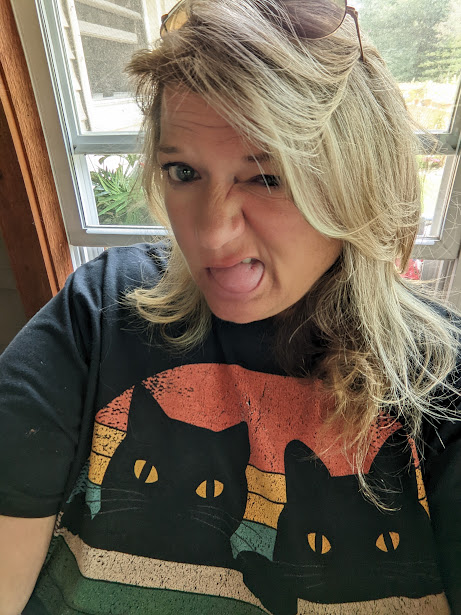WYD: A liquor store owner on your post asks you to escort him to the bank two blocks away after he closes so that he can make a night deposit. It’s 11 PM and it’s a high-crime area
Join me at 4pm, cst, today as we discuss Police Discretion #CRJ201 #Discretion
Join me at 4pm, cst, today as we discuss Police Discretion #CRJ201 #Discretion
Hello! Today we are going to be taking an in-depth look at #police #discretion. We have touched on this topic throughout the semester, but now really getting into the specifics of police decision-making. I look forward to your thoughts!
#CRJ201 #Discretion #MoraineValley
#CRJ201 #Discretion #MoraineValley
WWYD: The owner of an ambulance company who has been very helpful to you, asks you to complete an accident report on an accident involving one of his vehicles that occurred in another jurisdiction two days ago, which he needs for insurance purposes
#CRJ201 #Discretion
#CRJ201 #Discretion
WWYD: Your friend tells you that they committed a crime. They explain you are the only one they can trust with their confession. A few days later, you read in the paper that someone has been arrested for your friend’s crime.
#CRJ201 #Discretion
#CRJ201 #Discretion
WWYD: Your partner has a great sense of humor. However, sometimes jokes involve making fun of citizens in inappropriate ways. Do you say something or just laugh along with him?
#CRJ201 #Discretion
#CRJ201 #Discretion
WWYD: You are by yourself driving through an area that has commercial retail stores. You witness a man grab a woman's purse. The two of them are struggling for the control of the purse. The woman starts to strike the man with a baseball bat
#CRJ201 #Discretion
#CRJ201 #Discretion
WWYD: The local media advertises rewards for tips from citizens on breaking news stories. The put the call out for information on a heinous double-homicide you’ve just responded to ...
#CRJ201 #Discretion
#CRJ201 #Discretion
WWYD: You confront a suspect. As you approach from approximately 30 feet, the suspect pulls a small caliber pistol. You instantly notice a group of individual bystanders all with cell phones ready
#CRJ201 #Discretion
#CRJ201 #Discretion
WWYD: Your brother-in-law, an attorney, requests that you notify him of any motor vehicle accidents in your sector that may be civilly actionable. All he needs is a copy of the accident report and he will take it from there
#CRJ201 #Discretion
#CRJ201 #Discretion
WWYD: You respond to a subject in distress. As you walk up to the house, the front door opens and the subject violently appears. He steps out of the doorway and onto the front porch, shouting, waving something in the air
#CRJ201 #Discretion
#CRJ201 #Discretion
WWYD: The owner of your favorite gas station on your foot post offers you a key to the establishment’s office area, should you want to sit-down and relax while on the 12 AM - 8 AM shift, when they are closed
#CRJ201 #Discretion
#CRJ201 #Discretion
WWYD: A new officer, you pull over a clearly intoxicated driver. The driver fails the field sobriety test. The driver also happens to be your father ...
#CRJ201 #Discretion
#CRJ201 #Discretion
Officers routinely decide not to arrest people who are obviously breaking the law. Other examples of discretion include the following:
•Domestic dispute arrests
•Mental health commitments
•Traffic enforcement
•Deadly force
#CRJ201 #Discretion
•Domestic dispute arrests
•Mental health commitments
•Traffic enforcement
•Deadly force
#CRJ201 #Discretion

WWYD: A new officer, you're on lunch with your partner & a shift supervisor. The server tells the table that the lunch is on the house.
#CRJ201 #Discretion
#CRJ201 #Discretion
WWYD: You meet your younger sister's new boyfriend. What a scumbag. You know he's gotten into illegal dealings.
#CRJ201 #Discretion
#CRJ201 #Discretion
Police officers decide to arrest or not arrest. An arrest is dismissed at the police station because the sergeant thinks there is insufficient evidence.
#CRJ201 #Discretion #MoraineValley
#CRJ201 #Discretion #MoraineValley
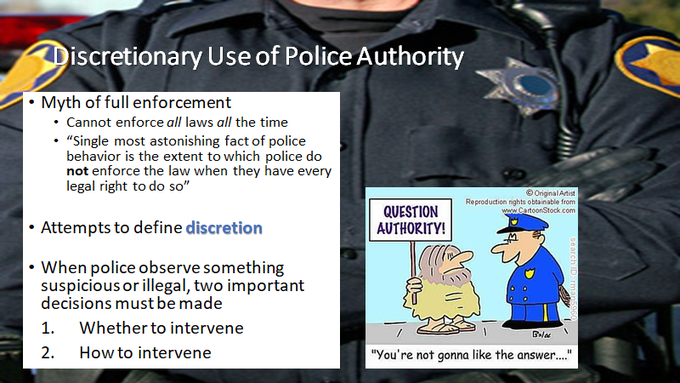
Let's take a moment to examine just a few of the sources of discretion as we move through the Criminal Justice process ...
#CRJ201 #Discretion #MoraineValley
#CRJ201 #Discretion #MoraineValley

A judge sets a very high bail of $100,000 that the defendant cannot raise. Another judge excludes evidence because of an unconstitutional search and seizure.
#CRJ201 #Discretion #MoraineValley
#CRJ201 #Discretion #MoraineValley

One judge sentences someone convicted of assault to probation and another person to prison for essentially the same crime.
#CRJ201 #Discretion #MoraineValley
#CRJ201 #Discretion #MoraineValley

The parole board decides to release one inmate on parole, but not another inmate with roughly the same criminal history.
#CRJ201 #Discretion #MoraineValley
#CRJ201 #Discretion #MoraineValley

Finally, a judge sentences some people convicted of first-degree murder to the death penalty while sentencing others convicted of the same offense to life imprisonment.
#CRJ201 #Discretion #MoraineValley
#CRJ201 #Discretion #MoraineValley

Another important development related to police discretion is the growth of a richer understanding of the complexity of police–citizen encounters.
#CRJ201 #Discretion #MoraineValley
#CRJ201 #Discretion #MoraineValley

WWYD: During routine patrol, you observe a vehicle fail to stop at several stops signs & a red light. In stopping the vehicle, the driver is in labor, on her way to the hospital.
#CRJ201 #Discretion
#CRJ201 #Discretion
Misuse of discretion is one of the most publicized aspects of modern police work
#CRJ201 #Discretion #MoraineValley
#CRJ201 #Discretion #MoraineValley

Discretion can be used in proper ways, to promote effective and efficient police work.
#CRJ201 #Discretion #MoraineValley
#CRJ201 #Discretion #MoraineValley

WWYD: A citizen has called to complain that neighborhood kids are hosting an "unlicensed" lemonade stand, it's increasing traffic. Legally, then don't have a license to be selling food/drink.
#CRJ201 #Discretion
#CRJ201 #Discretion
Supporters and critics of policing state that discretion creates 2 styles of policing, by the book & the 'real' way.
#CRJ201 #Discretion

#CRJ201 #Discretion


Police discretion is not limited to patrol officers, and not only to the decision to arrest or not arrest.
#CRJ201 #Discretion
#CRJ201 #Discretion

Officers at different ranks make discretionary decisions covering a wide range of actions
#CRJ201 #Discretion
#CRJ201 #Discretion

The broad scope of the criminal law in the United States creates significant problems for the police, which they deal with through the exercise of their discretion.
#CRJ201 #Discretion
#CRJ201 #Discretion

WWYD: You're a new officer & your online fling really wants some fun, flirty pictures of you in uniform.
#CRJ201 #Discretion
#CRJ201 #Discretion
One of the main reasons why the criminal law in the United States covers so many different kinds of behavior is that the American people have conflicting public expectations about what behavior should be illegal
#CRJ201 #Discretion
#CRJ201 #Discretion

James Q. Wilson comments that, in policing, “discretion increases as one moves down the organizational hierarchy.”
#CRJ201 #Discretion #MoraineValley

#CRJ201 #Discretion #MoraineValley


Patrol officers have been described as street-level bureaucrats. They make the decisions that produce actual police policy that people receive.
#CRJ201 #Discretion #MoraineValley


#CRJ201 #Discretion #MoraineValley



Jerome Skolnick observed years ago that “police work constitutes the most secluded part of an already secluded system of criminal justice and therefore offers the greatest opportunity for arbitrary behavior.”
#CRJ201 #Discretion #MoraineValley

#CRJ201 #Discretion #MoraineValley


Patrol officers cannot possibly handle every situation that comes up, and they have to exercise their discretion about how to use their time.
#CRJ201 #Discretion #MoraineValley
#CRJ201 #Discretion #MoraineValley

A patrol officer’s discretion is limited and controlled by a number of different factors.
#CRJ201 #Discretion #MoraineValley
#CRJ201 #Discretion #MoraineValley

Police discretion is influenced by the circumstances of each situation. Studies of the decision to arrest, for example, have found that it is affected by several situational factors.
#CRJ201 #Discretion #MoraineValley
#CRJ201 #Discretion #MoraineValley

Official department policies have a powerful influence over police discretion. Police departments also have their own informal organizational culture that influences officer discretion.
#CRJ201 #Discretion #MoraineValley
#CRJ201 #Discretion #MoraineValley

WWYD: A store owner has called you as a group of teens are hanging around. The youths haven’t committed any crimes but the owner says he feels intimidated. The youths state they are bored
#CRJ201 #Discretion
#CRJ201 #Discretion
Police officer discretion is also influenced by the local political culture. Local political culture influences police departments informally and not necessarily through written policy.
#CRJ201 #Discretion #MoraineValley
#CRJ201 #Discretion #MoraineValley

Virtually all experts agree on the need to control police discretion in order to prevent abuse of police authority
#CRJ201 #Discretion #MoraineValley
#CRJ201 #Discretion #MoraineValley
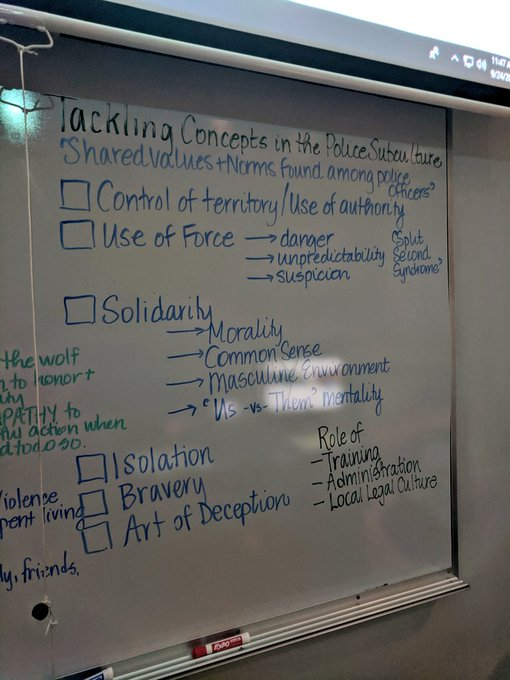
The so-called myth of full enforcement and denial of discretion existed for several reasons.
#CRJ201 #Discretion
#CRJ201 #Discretion

Gaining compliance, cooperation and @BeLikeBenaiah
3 Phase Citizen Encounter model #ExcellenceInPolicing
#CRJ201 #Discretion #MoraineValley



3 Phase Citizen Encounter model #ExcellenceInPolicing
#CRJ201 #Discretion #MoraineValley

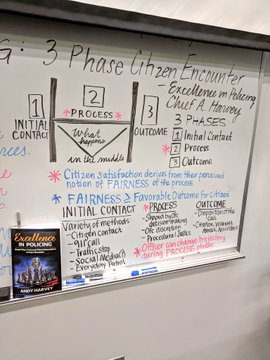
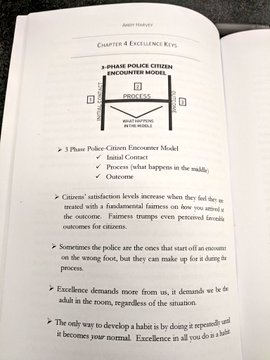

The debate over abolishing police discretion parallels similar debates over how to control discretion in other parts of the criminal justice system: plea bargaining, sentencing, parole release, and so forth
#CRJ201 #Discretion #MoraineValley
#CRJ201 #Discretion #MoraineValley
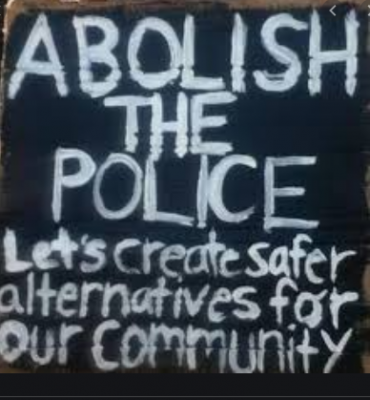
There is now a general consensus that attempting to abolish discretion is both unwise in principle and impossible in practice.
#CRJ201 #Discretion #MoraineValley
#CRJ201 #Discretion #MoraineValley

The method of controlling discretion that has evolved is through the use of written policies that guide the police officer’s exercise of discretion. This approach is called administrative rule-making.
#CRJ201 #Discretion #MoraineValley
#CRJ201 #Discretion #MoraineValley
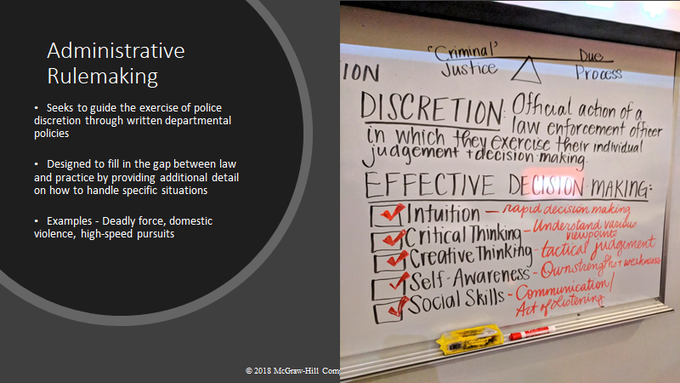
Administrative rule-making seeks to guide the exercise of police discretion through written departmental policies.
#CRJ201 #Discretion #MoraineValley
#CRJ201 #Discretion #MoraineValley

These policies typically specify
(1) what an officer must do in certain situations,
(2) what he or she may not do in those situations, and
(3) what factors an officer should take into consideration in deciding on a course of action.
#CRJ201 #Discretion #MoraineValley
(1) what an officer must do in certain situations,
(2) what he or she may not do in those situations, and
(3) what factors an officer should take into consideration in deciding on a course of action.
#CRJ201 #Discretion #MoraineValley

Written rules offer obvious advantages.
They provide direction for officers on how to handle critical incidents. Written policies promote consistent performance throughout the department.
#CRJ201 #Discretion #MoraineValley

They provide direction for officers on how to handle critical incidents. Written policies promote consistent performance throughout the department.
#CRJ201 #Discretion #MoraineValley


WWYD: A citizen calls regarding a barking dog. Upon arrival, the animal has been left outside with no food or water.
#CRJ201 #Discretion
#CRJ201 #Discretion
Having rules and making them public, moreover, eliminates the secrecy surrounding police activities and officer discretion.
The basic argument in favor of administrative rule-making is that it is more effective than other means.
#CRJ201 #Discretion #MoraineValley
The basic argument in favor of administrative rule-making is that it is more effective than other means.
#CRJ201 #Discretion #MoraineValley

There is persuasive evidence that administrative rule-making has produced some significant improvements in policing.
#CRJ201 #Discretion #MoraineValley
#CRJ201 #Discretion #MoraineValley

WWYD: A local funeral director asks you to hold-up traffic at a busy intersection so that he can get a funeral procession moving away in good order.
#CRJ201 #Discretion
#CRJ201 #Discretion
Rules designed to control discretion are effective only if officers comply with them fully.
The basic strategy is to require officers to file a written report after each incident, and to have each report automatically reviewed by supervisors
#CRJ201 #Discretion #MoraineValley



The basic strategy is to require officers to file a written report after each incident, and to have each report automatically reviewed by supervisors
#CRJ201 #Discretion #MoraineValley




Written rules and policies are collected and codified in a department’s standard operating procedure manual.
#CRJ201 #Discretion #MoraineValley
#CRJ201 #Discretion #MoraineValley

The President’s Task Force on 21st Century Policing Action Item 14.1 recommended that departments make their policy manuals publicly available as a way of building community trust and confidence in the police.
#CRJ201 #Discretion #MoraineValley
#CRJ201 #Discretion #MoraineValley

Leading experts on police discretion have urged the police to engage in systematic rule-making.
#CRJ201 #Discretion
#CRJ201 #Discretion

WWYD: Your supervisor tells you and other officers in your sector to report all attempt car thefts as “vandalism,” to reduce the increasing incidence of these offenses in your municipality
#CRJ201 #Discretion
#CRJ201 #Discretion
Some citizen oversight agencies also contribute to rule-making through a process known as policy review.
Police auditors have the authority to review any and every aspect of the operations in the agency under their jurisdiction.
#CRJ201 #Discretion

Police auditors have the authority to review any and every aspect of the operations in the agency under their jurisdiction.
#CRJ201 #Discretion


Police organizations have been characterized as punishment-centered bureaucracies, with many rules that tell officers what not to do and few rewards for positive police work.
#CRJ201 #Discretion
#CRJ201 #Discretion

In Your Opinion: Does police officer discretion have more positive / negative consequences?
#CRJ201 #Discretion
#CRJ201 #Discretion
In Your Opinion: Of the following, why is ethical use of discretion so important to policing?
#CRJ201 #Discretion
#CRJ201 #Discretion
In Your Opinion: Was there once was a time in America when the police officer’s word was enough for public & media trust?
#CRJ201 #Discretion
#CRJ201 #Discretion
Which of the following questions are most helpful in using discretion effectively?
#CRJ201 #Discretion
#CRJ201 #Discretion
Considerations for effective discretion:
~ What are alternatives?
~ Who is effected?
~ What are consequences?
~ How will this look under scrutiny?
#CRJ201 #Discretion
~ What are alternatives?
~ Who is effected?
~ What are consequences?
~ How will this look under scrutiny?
#CRJ201 #Discretion
I'd really love to increase participation in our discussions, what recommendations do you have for me?
#CRJ201 #Discretion
#CRJ201 #Discretion
DISCLAIMER: All decision-making scenarios were used for discussion &/or humorous (or lack thereof) purposes and should not be seen as advocating of any policy
#CRJ201 #Discretion
#CRJ201 #Discretion
If you did like this discussion, please share our #WWYD scenarios to increase participation! Thanks in advance.
I appreciate any & all feedback, have a safe evening.
#CRJ201 #Police #Discretion @morainevalley
I appreciate any & all feedback, have a safe evening.
#CRJ201 #Police #Discretion @morainevalley
• • •
Missing some Tweet in this thread? You can try to
force a refresh















